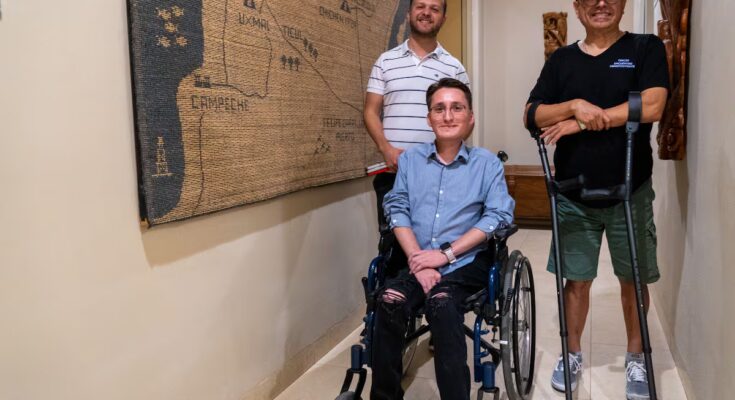Óscar Zaldívar, who everyone knows as Pollo, fought in 2023 against the Disability and Inclusion Law of Durango, his state. The text states that “it will be guaranteed” that 2% of the public and private workforce is dedicated to people with disabilities. The law’s problem wasn’t even the figure – which was already far less than the 10% of the population this group represents in Durango – but the verb. “Do you imagine that the deputies, when they tell you, will try to pay you every 15 days?”, repeated Zaldívar, who is now 33 years old and blind: “You don’t want it to be done, do you? You want it to be mandatory.” Lawmakers, Pollo says, had “the talent of making what was already bad worse” and decided to tackle the problem by eliminating the 2%. “Now there isn’t even a figure. Let’s try.”
The battle to promote employment among people with disabilities has been Zaldívar’s obsession for years. According to data from the National Institute of Statistics and Geography (Inegi), published last year, only four in ten people with disabilities have paid work in Mexico. The figure drops for women, to 3 out of 10. Not only that. In the country there are 8.8 million people with disabilities (7.6% of the population) and 35% of them have not been able to finish primary school. This very high percentage contrasts with what the group calls a conventional person. For example, in Mexico only 3% of people without disabilities do not attend school, a figure that rises to 15% for those with a disability.
In this scenario, Pollo turned to a public television channel to fight with a representative for his 2% share. “I think he was already fed up. And he said to me, ‘Well, if you don’t like the way the law is, then stop, it’s as simple as keep fighting.’ And this phrase is very revealing because, well, yes, of course, continuing to fight, but the history of people with disabilities is to fight against architecture, against discrimination, against unemployment, against educational barriers, but also to fight against those who should represent you, well, we’re already done,” says the activist, at the constituent meeting, in Valladolid (Yucatán). Zaldívar then turned that phrase into a book that he presented to the Senate that consolidates the years of struggle of groups and organizations across the country for something as simple as being represented.
Ian Figueroa, 25, Sonora
Ian Figueroa was 12 years old when he first had to sit in a wheelchair. He had been diagnosed with muscular dystrophy and recovering from a bad accident, in which he broke his leg, ended up weakening his muscles. “After going to therapy and using crutches, a walker and a cane, it became very tiring for me to stand or walk. That’s when I started using the chair and seeing life in a different way,” explains this 25-year-old International Relations graduate. “I had the opportunity to experience both sides. It was a very abrupt change, because as soon as you sit in a wheelchair the world treats you differently.” He stopped going to the same places as his friends: is the place on the first floor? Does it have a ramp? And a large entrance? Does it have adapted bathrooms?—, in the eyes of many it has become a burden—“the simplest things are annoying, if you have to walk along a road and have to wait for people in wheelchairs”—and an expense—“many don’t even want us to be given a budget”—.
Thus Figueroa states: “The biggest obstacle I have encountered in recent years is precisely the culture of inclusion”. “There are also other infrastructural or health challenges, but the main thing is to change the way people think and act towards people with disabilities, and from there we can push them to build good ramps and good sidewalks,” says the activist, who founded Another Feeling, a civil association in Hermosillo, the capital of Sonora, precisely to raise awareness of these issues, especially in schools. “Children have no filters, so they see a person with a mobility disability, without a leg, and ask why they don’t get another one,” he laughs.
Figueroa, who has been unable to find a job related to his studies, is now focused on clearing the blocks imposed by the laws. “In the State Council for Persons with Disabilities, the person without disabilities is responsible because the very word that appears in the law is that ‘preferably’ the head will be a person with disabilities, but we don’t want preferably have a disability, but rather that they know the disability first-hand to ensure they are working towards the needs that actually exist,” he emphasizes.
Representation in management that guarantees their rights is the minimum level. From there, councilors, municipal presidents, deputies and senators are missing. “There has never been a local representative with a disability in Sonora, which terrifies me because for several years we have had positive actions that should be exhortations to political parties,” Figueroa says. Despite this, he says: “There is a lot of work to do, but we are tireless.”
Óscar Curiel, 56 years old, Jalisco
In Jalisco there are 1,481 councillors, of which only 15 are people with disabilities. And that figure, which is equivalent to 1%, is the result of a struggle that lasted years. Óscar Curiel, member of Findedis (Foundation for the Inclusion and Development of People with Disabilities), is the promoter of this struggle, in which every victory was followed by a barrier. “I have been part of political parties for more than 20 years, in electoral campaigns, as a district coordinator, I have mobilized people… and I have always wanted to be in the place where decisions are made to make public policies. Yet, there is no space for a person with a disability,” reveals Curiel, who suffers from multiple sclerosis and can no longer walk without crutches 18 years ago.
Its first major success came in December 2020, when an Election Tribunal ruling mandated affirmative action, so-called quotas, to include the disabled population in the following year’s elections. This wake-up call came after only 19 of 6,864 candidates, or 0.28%, showed up in the 2018 federal election. “This information demonstrates that it is necessary to create measures that open up spaces for political representation in deliberative and decision-making bodies,” the Court ruled. “But Jalisco did not comply,” summarizes Curiel, who is a lawyer and works as coordinator of the Zapopan cemetery.
They took on the task of doubling the pressure by 2024 and achieved that in 19 municipalities – the largest in the state – political parties had to propose, at least, a formula for people with disabilities. “But there were people who invaded us, who passed themselves off as disabled without having them. For example, people who wore glasses and their private doctor gave them proof of visual impairment,” he explains. And, faced with the obstacle, they continued to press: so from this year it will be mandatory to present both the certificate and the credential for a person with a disability. And they managed to ensure that there is already a candidacy in 49 municipalities of Jalisco.
“The goal is for political parties to take us into consideration in 2027. First of all, it was to make us visible. Well, we are already seen. Now let’s take care of ourselves. Because many people in the group have studies, have experience, can hold a position without any problem and also guarantee the rights of people with disabilities,” says Curiel, who also has a post-doctoral degree: “We are prepared people. And let’s continue to prepare, to professionalize, so that there isn’t that discouragement of saying: ‘Well, we already know it. We opened it to people with disabilities and now what are they doing?” No, let’s continue.”



